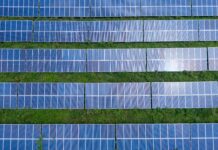Doug Young
One of China’s 2 major meltdowns in the solar panel sector has taken a big step forward with word that trading in shares of LDK Solar (NYSE: LDK) has been suspended and the de-listing process formally begun as the company liquidates. Meantime, word of a missed interest payment by a building materials maker is sending the latest signal that China will let more companies in ailing sectors default on their debt rather than pay off their creditors. That’s an important signal for the solar sector, which relies heavily on such debt to finance its operations and where many smaller players are in danger of similar defaults.
Let’s start this solar summary with LDK, which together with former solar superstar Suntech (OTC: STPFQ) is in the process of liquidating amid a broader sector clean-up. But whereas Suntech has been liquidating under the supervision of a bankruptcy judge, LDK has chosen the stranger route of winding down without such protection. Perhaps that’s not too surprising since China is quite new at bankruptcy reorganizations, though it has created a strange process where LDK has been quietly talking with its creditors and selling off assets in a process that’s not too transparent.
The company gave an update last week on talks with its bondholders and an interim financing agreement (company announcement), and has just provided a further update on the imminent de-listing of its stock. (company announcement) According to the announcement, trading in shares of LDK has been formally suspended something that should have happened long ago. LDK also said the New York Stock Exchange has begun a process of de-listing the company’s shares.
Suntech’s shares were de-listed from the New York Stock Exchange months ago and now trade over the counter, following the company’s bankruptcy declaration about a year ago. Such a de-listing didn’t happen for LDK because it never formally declared bankruptcy, which is why the stock exchange itself is finally taking an action that should have happened months ago.
According to its latest announcements, LDK is still talking with bond owners about terms for paying off its debt, offering 20 cents for every $1 of investment. The process still looks like it may take a while to complete, but I expect LDK to disappear as an independent company by the end of this year.
Meantime, let’s look at the other major news that sends the latest signal that more solar companies could soon default on their debt payments. That would accelerate a process that saw 1 company default on a bond interest payment last month and another move in a similar direction. The latest reports say that closely held building materials maker Xuzhou Zhongsen failed to make a 180 million yuan ($29 million) payment on some high-yield bonds that was due on March 28. (English article)
That particular story is related to the real estate sector, which is gearing up for its own much-needed correction following a housing bubble that has seen property prices soar to ridiculous levels over the last decade. But the more important message is that Beijing will let ailing companies default on their debt, and make investors more responsible for losses when they buy risky bonds. That would mark a sharp shift from the past, when government entities would almost always come to the rescue of state-run companies that were in danger of defaulting on their debt.
Last month saw a major milestone when mid-sized solar panel maker Chaori Solar missed a bond interest payment, becoming the first such corporate bond default in modern Chinese history. Not long after, trading in shares of Baoding Tianwei (Shanghai: 600550) was suspended as it too flirted with a debt default. (prevoious post) This latest default by Xuzhou Zhongsen shows that the flow of defaults is likely to pick up in the months ahead, hitting many mid-sized and smaller solar players and hurting the ability of larger players to raise new funds.
Bottom line: LDK’s liquidation is likely to be complete by year-end, while the latest market signals indicate more smaller solar companies will default on their debt in the months ahead.
Doug Young has lived and worked in China for 15 years, much of that as a journalist for Reuters writing about Chinese companies. He currently lives in Shanghai where he teaches financial journalism at Fudan University. He writes daily on his blog, Young´s China Business Blog, commenting on the latest developments at Chinese companies listed in the US, China and Hong Kong. He is also author of a new book about the media in China, The Party Line: How The Media Dictates Public Opinion in Modern China.






